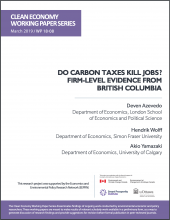March 2019
This paper investigates the employment impacts of British Columbia’s revenue-neutral carbon tax. We develop a revised approach to implementing the synthetic control method to firm-level employment data, allowing us to estimate heterogeneous impacts across industries. We find that the employment effects vary across sectors, specifically small service firms see their employment increase, while employment of larger energy-intensive and trade-intensive manufacturing firms decreases. These results provide new evidence for the “job-shifting hypothesis” of the revenue neutral tax. Tax cuts increased the purchasing power of low-income households benefiting locally operating businesses (such as restaurants, massage or yoga studios) at the expense of the more internationally-exposed larger manufacturing firms. In contrast to previous papers, we find that the aggregate employment was unaffected by the BC policy.
Authors:
Deven Azevedo, Department of Economics, London School of Economics and Political Science
Hendrik Wolff, Department of Economics, Simon Fraser University
Akio Yamazaki, Department of Economics, University of Calgary
The Clean Economy Working Paper Series disseminates findings of ongoing environmental and clean economy work conducted by researchers from a range of disciplines. These working papers are meant to make results of relevant scholarly work available in a preliminary form. Although these papers have not undergone a peer-review process, they meet general standards of scholarly excellence. The views expressed in these working papers are those of the authors and do not necessarily reflect the opinions of Smart Prosperity Institute.




